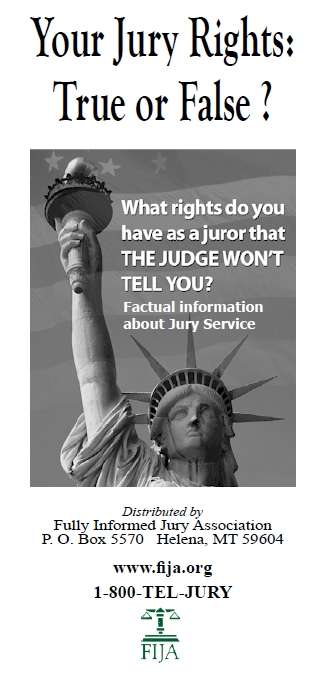Michigan Juror Rights Pamphleteer Free From Jail Pending His Appeal
Keith Wood argues that his distribution of flyers was protected by the First Amendment.

Keith Wood, the Michigan activist who was sentenced to jail last week for handing out pamphlets on the sidewalk in front of the Mecosta County courthouse, was freed on Friday pending his appeal of his jury tampering conviction. Judge Eric Janes granted an emergency stay of Wood's sentence, which includes eight weekends in jail as well as six months of probation, 120 hours of community service, and $545 in fines, after considering the arguments that his attorney, David Kallman, is raising on appeal, which include the trial judge's refusal to allow a First Amendment defense.
Kallman argues that Wood's distribution of Your Jury Rights: True or False?, a flyer published by the Fully Informed Jury Association (FIJA), was constitutionally protected speech. The FIJA pamphlet argues that jurors have the right to judge the law as well as the facts of a case and to acquit a defendant in the interest of justice even when he is guilty according to the judge's instructions regarding the law.
"By prosecuting Mr. Wood," Kallman said in his 2015 motion to dismiss, "the State is engaged in nothing less than tyranny and oppression. Few legal principles are more clear than the one stating that 'handing out leaflets in the advocacy of a politically controversial viewpoint…is the essence of First Amendment expression.'" After refusing to dismiss the jury tampering charge against Wood on First Amendment grounds, Judge Kimberly Booher told Kallman he could not mention the issue to the jury, which convicted Wood last month.
Kallman also maintains that Booher erred by prohibiting him from arguing that Wood could not be guilty of trying to "influence the decision of a juror in any case by argument or persuasion" because there was no case to influence. The only case pending at the courthouse on the day Wood distributed the flyers, which involved a man accused of illegally filling a wetland on his own property, was settled by a guilty plea that day.
Kallman likewise says Booher should have let him argue that none of the passers-by to whom Wood gave pamphlets could have qualified as a juror. "We argued, and the Michigan Supreme Court has agreed in earlier case precedent, that a person is not a juror until sworn in to serve on a jury in a case," he says. Since no jury was ever chosen in the wetland case, Kallman argues, there were no jurors to persuade.
Kallman says an assistant prosecutor asked Judge Janes for a gag order that would have prohibited Kallman and Wood from publicly discussing the case. "She was very upset with the media attention given this case and did not want me talking with the media," Kallman says. "The judge dismissed the request out of hand."


Show Comments (41)